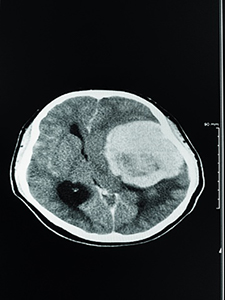According to the results from the small phase II CEVOREM trial, a targeted combination of the mTOR inhibitor everolimus and the somatostatin agonist octreotide showed antitumor activity in patients with recurrent meningioma not amenable to any type of surgery or radiotherapy. These findings were published in Clinical Cancer Research by Graillon et al.

Photo credit: Getty
Aggressive meningiomas that progress after surgery and radiotherapy represent an unmet medical need. The current 6-month progression-free survival rate is estimated to be between 11% and 15% in untreated recurrent meningiomas, and treatment is considered of interest if the 6-month progression-free survival exceeds 35%.
Study Methodology
CEVOREM is an open-label, prospective, multicenter, single-arm phase II study that was conducted at two centers in France. The researchers investigated the effectiveness of everolimus and octreotide in 20 adults with meningiomas as defined by the World Health Organization. Two patients had grade 1 tumors, 10 had grade 2 tumors, and 8 had grade 3 tumors. In addition, four patients harbored an NF2 germline mutation. All patients received 10 mg of oral everolimus daily and 30 mg of octreotide administered monthly by intramuscular injection.
The primary endpoint of the study was the 6-month progression-free survival rate. Secondary endpoints were overall survival, response rate, tumor growth rate according to central review, and safety.
Study Results
KEY POINTS
- Progression-free survival at 6 months was 55%, significantly exceeding the typical rate of between 11% and 15% in untreated recurrent meningiomas, and 6- and 12-month overall survival rates were 90% and 75%, respectively.
- Analysis of tumor growth rate should be considered in future clinical trials on meningiomas, which can provide a highly sensitive pretherapeutic vs posttherapeutic efficacy marker.
The researchers found that the overall 6-month progression-free survival was 55% (95% confidence interval [CI] = 31.3%–73.5%), and overall 6- and 12-month survival rates were 90% (95% CI = 65.6%–97.4%) and 75% (95% CI = 50.0%–88.7%), respectively. A major decrease (> 50%) was observed in the growth rate at 3 months in 78% of the tumors. The median tumor growth rate decreased from 16.6%/3 months before inclusion to 0.02%/3 months at 3 months (P < .0002) and 0.48%/3 months at 6 months after treatment (P < .0003).
“The combination of everolimus and octreotide was associated with clinical and radiological activity in aggressive meningiomas and warrants further studies. Decrease in the tumor volume growth rate should be considered a complementary and sensitive endpoint to select potentially effective drugs for recurrent meningiomas,” concluded the study authors.
Translational Relevance
“The combination of everolimus and octreotide yielded a meaningful, prolonged tumor stabilization in many patients,” said lead author of the study, Thomas Graillon, MD, PhD, Assistant Professor of Neurosurgery at La Timone Hospital in Marseille, France, in a statement. “Our results indicate that this combination treatment could be considered as a viable treatment option for aggressive meningiomas and studied further in a randomized trial.”
Disclosure: For full disclosures of the study authors, visit clincancerres.aacrjournals.org.

